Rachel Glenister
She is always happy and welcoming in her classes! She picks great music and always finds ways to engage us. We can talk to her and trust her like a friend. She’s a wonderful person!
On a daily basis, I am blown away by the work of educators the world over. Not only am I lucky enough to have crossed paths with inspirational teachers throughout my life but many of you share your stories of incredible people you’ve had the joy of encountering – people who are changing the world one student at a time. Every Thursday, I will share a new “Teacher of the Week” and invite you to submit your nominations.
She is always happy and welcoming in her classes! She picks great music and always finds ways to engage us. We can talk to her and trust her like a friend. She’s a wonderful person!
Erin Goeke (Go-Kee) is the choir director at Durham Middle School in Lewisville, Texas. Erin graduated from Sam Houston State University with a degree in Music Therapy. She obtained her certification as a music therapist, but then quickly decided that she could make a bigger impact by becoming a music teacher. She’s just starting her fourth year at Durham and was honored as Teacher of the Year last year. How she handles 200+ 6th, 7th and 8th graders every day is a mystery to me, but I suspect she uses her music therapy skills to keep everybody balanced. This year she introduced a new after school program called “Karaoke with Goeke” which was a big hit! I know her students mean the world to Erin and she means the world to me. In her “spare time,” Erin joined a Sweet Adelines chorus called the Rich-Tones and we will be competing at the International contest in St. Louis in October.
Mrs Coon has been my teacher for 3 years, but she’s been teaching and singing for longer than I’ve been alive. She manages to bring fun into even the most boring songs and makes the hour a day I spend in her class my favorite. Her tireless efforts to make the Chico High choir the best it can be and the love she gives to each and every student makes her not only the best teacher here, but my personal role model.
I am nominating my band teacher, Hope Watts, because she is a constant inspiration for every student she teaches. I also give her props for having to deal with all the drama of high school AND middle school students. She inspired me to become a band teacher. These are some of the reasons why I think Hope Watts is the perfect candidate for teacher of the week.
Amanda has been teaching at the same middle school for her entire decade long career and has grown the program to pushing 400 kids. Many of her students have gone on to be musicians and teachers themselves. This year her Varsity Treble Choir was selected to perform at the 60th National ACDA Conference, the first middle choir in her district’s history. She also has poured into several new teachers over the years when they are her assistant and then move in to run their own programs. More than anything, her students mean everything to her and all she wants is to see them learn to love music. She is the best teacher I know.
Mrs. Clausen always sees the potential in all of her students and wants to do everything she can to help them succeed. She provides them with many opportunities that will help them grow. Not only is she a great teacher, but she’s also a great role model and inspiration.
Russell just retired in June from the Princeton Public School System, 36 years there at JW Middle School and 41-1/2 years all together – but still teaches four nights and Saturdays in Flemington, NJ. His students love him and many will have a different teacher but transfer to him. He teaches violin, viola and cello. Plus he has an orchestra that he founded with two friends – Newtown Chamber Orchestra in Newtown, PA starting its 29th Season this fall. He works so hard to bring music to the community and to children – he should qualify for a ‘Teacher of the Week’.
Russ Christensen is the former choir director of the Grammy-Award winning chamber choir at Sprague High School in Salem, Oregon and current director of Oregon State University’s award-winning Meistersingers. He has upheld a tradition of excellence, musicality and poise throughout his career. His ability to direct over 100 students at a time in beautiful order and unison is that of master status. Though he holds his choirs to high standards, he’s able to keep great rapport with his peers and the singers he directs. He’s mastered the ability to keep students engaged, comfortable and motivated toward excellence.
Dr. Broeker is the most loving and generous human being and an incredible Choral music educator. She teaches with such kindness, empathy and grace and is an inspiration to all of the students she comes into contact with. After two weeks of graduate conducting this summer, she gently reminded our class “You are enough. As you already are, you are enough.” Her belief in each of her students is so encouraging…and she is a brilliant musician to boot!
This man has created such a loving environment in our choir deparentment and strives not for perfection, but for us as singers to enjoy ourselves and the music. He genuinely wants us to thrive and enjoy the ride along the way. I’ve never met a more generous and caring man who thoroughly cares for their students. He’s been such a big father figure in my life and loves unconditionally to all his students.
Dr. Robinette is without a doubt, one of the greatest teachers I have ever had the fortune to study under. Not only is he genuine, but he deeply cares about his job and the students he teaches. Andrew has inspired countless students in the field of Music Education and it is because of him that he inspired me to become a teacher like him and better me as a person. I owe everything to him as he has saved my life in more ways then one.
Mrs Snodgrass has given me so many opportunities to thrive in my choir. We have been able to sing in such places as Carnegie Hall and The White House. This is all due to her tireless work. Her classroom environment is a safe place for all, and her teaching is amazing. She does so much for all of her students. She really goes above and beyond. Mrs Snodgrass truly loves all of her students like a mother.
He brings true musicality to any piece he presents to the choir. They look challenging in regards to language or rhythm but on his off time, he’s in his office, conducting and practicing for our next rehearsal. I will forever be moved at the simple gesture of watching my teacher love what he does in the classroom and be prepared for any questions or trouble areas. His humor and awkwardness helped the process of teaching and creating an unbreakable bond between him, the students, and the piece.
Mrs. Morris is more than just a teacher to a lot of us. She’s a mom. We have a wonderful choir full of talented kids but we all agree that the reason we sing is because of Morris. Even after having a baby of her own she still manages to be there for us whenever we need her. She makes us all the best version of ourselves.
Mr. Roth is an amazing person inside and out. He pushes us to be better everyday, and never lets us give anything but out best. Besides giving us the gift of music, Mr. Roth has been such a positive and supportive person to so many of us in the band program. Because of him, I want to be a music educator. Everyone needs a David Roth in their life.
Brandon has been the Choral Director at Lincoln High School, Rhode Island for 7 years. In his time there, he has helped to build a strong and passionate choir, while helping to build the understanding in the town of why music is important. He also hosts the annual variety show and coaches girls tennis, drawing across lines of expectations that music kids can also be actors, math-wizzes, and jocks. Brandon is an inspiration to the town, the school and his students and his level of dedication is second to none
He has been a big part in making the dreams of thousands of aspiring sound engineers, including myself, come to life. He is a lecturer and a director at the Academy of Sound Engineering in Auckland Park, South Africa. He is a mentor to me and one of my biggest role models. I truly believe that he is more than worthy for your Teacher of The Week pick.
Mrs. Svenn is the choir director that, ten years later, students still come to for help (musical or otherwise), invite to celebrations, and call for a simple chat. She worked us hard, but lovingly, showing us to be responsible, committed, and passionate in both our musical and daily lives. She opened up her home to us for hot cocoa and Christmas carols in the winter and traveled far with us for fun musical journeys in the spring. She gave us her all, inspiring us to give our all just the same. Today, she is still as inspiring, passionate, and overwhelmingly caring as she was when I first joined choir. It’s a joy to see her choirs perform every season, watching new faces just as in love with music as we were at their age.
Mrs. Glenister has been my choir director for 3, going on 4 years. She not only has helped me learn so much music but has helped my composing/arranging career prosper, in addition to helping me develop perfect pitch
Mr. Tietge is the choir director for both Santa Fe junior high and Santa Fe high school. He works tremendously hard to make sure his student are as prepared as they can be. Especially when it comes to UIL or TMEA. He has inspired students like me to pursue my dreams and take action no matter what people may say about you. “It’s not bragging if it’s true!”
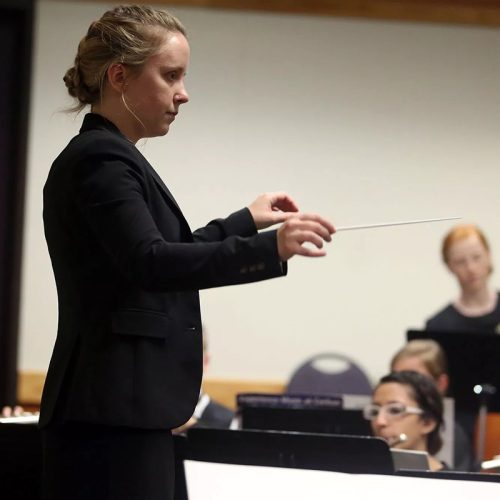
Ms. Greenwell (now Lewis) is an extraordinary human being & teacher that strives for excellence while remembering to connect. She has an amazing spirit & sense of humor. Her love for music & quite honestly, this composer, is unmatched. She is alive when she talks about music & it is beautiful!
Allie is my band teacher. Always will be, and I know you know how much weight that holds. I was a sophomore in HS playing upright bass in a jazz band, it was her first year teaching. She took a huge risk taking an underpaid band director position out in the boonies to work with underprivileged kids in my rural community. She was there every morning during zero period, every concert band rehearsal, and she was there for any and every kid who took the long walk down to the band room to feel safe. She was my school’s first safe place for the art kids, music kids, the poor kids, the Mormons who got bullied… She was my safe place too, and I don’t think I’ve ever told her. So Mrs. Greenwell, this one’s for you. I hope you get to meet your idol! 🥰 Go Cascade!!!
Allie Greenwell is an incredibly dedicated music teacher. She connects with her students in a way most people can’t. She brings the music alive in the ensemble’s soul and uses incredible patience to teach and guide her students to success. She believes in every student who walks in her door and she welcomes them into the musical family she’s fostered through the years. If anyone deserves to be recognized for being an outstanding teacher, it is her. Please consider Allie for teacher of the week, because for many of her students, she is a teacher of a lifetime! 💖
Thank you, Allie, for changing the world one student at a time
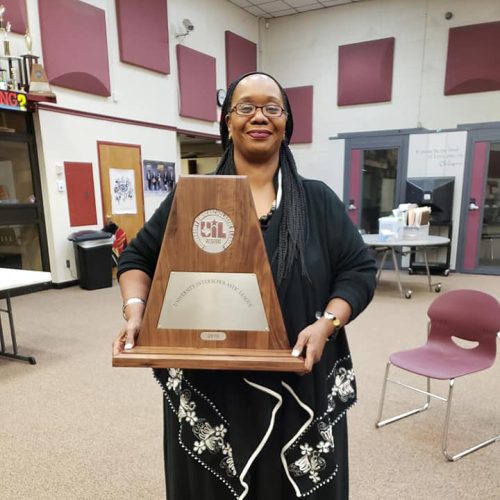
Stephanie was a classmate and then a co-worker who took over the band program at Liberty Eylau ISD in Texarkana, TX around 20 years ago. She loves her students and tirelessly guides her students to excellence in music and life. She is the epitome of a great teacher!
Thank you, Stephanie, for changing the world one student at a time.
Thanks to Kristi for the nomination
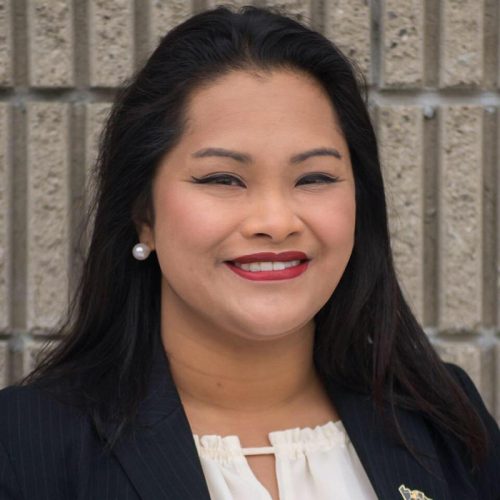
First of all, she is the biggest Eric Whitacre fan! More importantly she always encourages her students to try their best and she does everything in her power to make choir a fun and safe environment for everyone. She works harder than most teachers I’ve seen and she deserves to know that her work is appreciated by her students. As our high school choir continues to sing Whitacre pieces, Ms. M fuels our passion to sing. As a student I am so proud to be a part of such an amazing choir directed by an even more amazing teacher! We love you Ms. M!
Thank you, Christine, for changing the world one student at a time.
Thanks to Francesca for the nomination
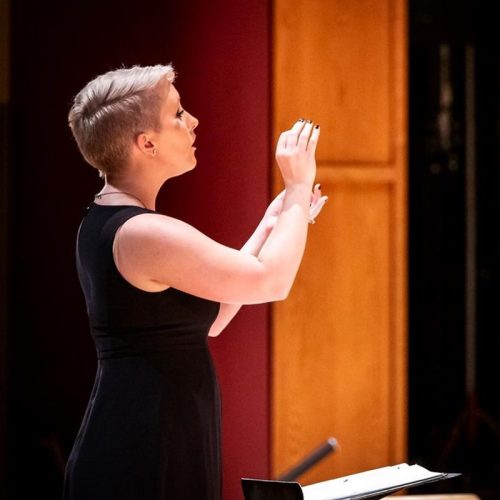
I am nominating Megan because she not only supported me as a musician but also as a person. High school was a turbulent time in my life and she created a space where I felt safe to try new things and go out of my comfort zone. I will forever credit her with building my lasting love of choir and truly believe she deserves any and all forms of praise possible.
Thank you, Megan, for changing the world one student at a time.
Thanks to Lily Kate for the nomination
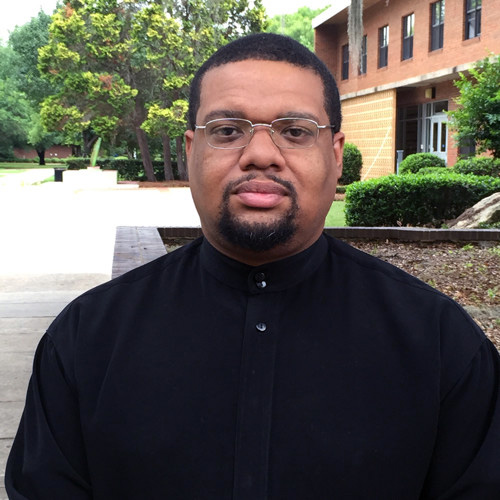
I am nominating Mr. Baxter because honestly, this man has changed my life. He’s my band director from high school and he is the reason I chose to major in music education at my current university. Mr. Baxter is a wonderful director but an even better friend. He has these slogans that I plan to take to my future children that I am educating. When I first joined the band, I wasn’t a shy cookie, and he used that to make me into the leader that I am today. Thank you Mr. Baxter for enriching the minds of every student that you have educated throughout the years, including me.
Thank you, Jon, for changing the world one student at a time.
Thanks to Jayden for the nomination
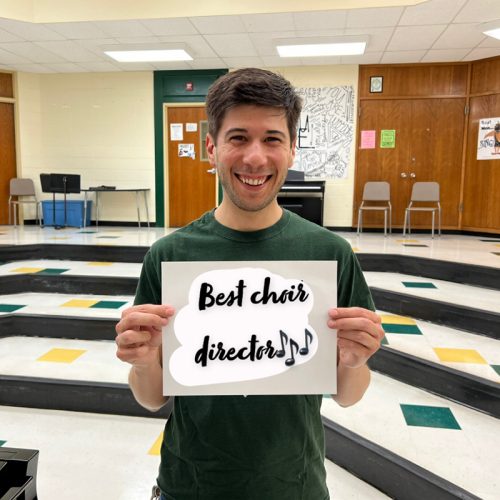
Mr. Duncan has touched the lives of many of his students and makes sure that they are loved and cared for! He brings an uplifting and goofy energy while we sing. Inspires all of the music nerds with music and life lessons. Jokes around and creates a community where everyone feels safe. Our choir is a big family who bonded through his class. He always pushes us to our absolute 100% potential. He has helped me personally more than he knows, saved my life even and I can’t thank him enough. He just shows that we have the talent to go far and the grit to reach beyond! He also has taught us the way of sarcastic humor and dad jokes. No matter what I know he’s touched the lives of hundreds probably thousands. He brings a light to the room no one else can!
Thank you, Jon, for changing the world one student at a time.
Thanks to Isabella for the nomination

Miss Dexter is an engaging, committed, and gifted educator. Her third grade classroom is one where acceptance, tolerance, exploration, and the simple joys of learning are celebrated each and every day. Every member of her learning community is valued for their individual gifts, and a sense of community and mutual respect is fostered. The ‘explorers’ (Adventure is out there) is the classroom theme, and they together discover the many ways in which learning in a caring, respect-filled community can bring both joy and knowledge. My spouse Daphne (a weekly classroom volunteer) and I are most proud of this caring and dedicated educator – who just happens to be our daughter.
Thank you, Polly, for changing the world one student at a time.
Thanks to Jeffrey for the nomination

Tim is a very talented young man from the UK who during the pandemic created a simple, accessible virtual choir – Choirantine – that encourages people with a broad range of musical skills to participate. Many cannot read music: he supports “learning by ear”, yet provides technical information to those with more musical knowledge. His repertoire of songs for the VC spans the gamut of musical genres. With all due respect to Queen and Freddie Mercury, I think our rendition of Bohemian Rhapsody is better than the original! I have personally participated in 35 of Tim’s songs, yet I only started in July 2020. Many participants, myself included, are VC 6 alumni. Tim has given us the opportunity to hang on to the spirit created by Eric Whitacre with his Sing Gently, and continue to sing together, still today. Tim was recently accepted to Berklee College to advance his own musical education and just relocated from the UK to Boston. I cannot think of anyone more deserving of this award.
Thank you, Tim, for changing the world one student at a time.
Thanks to Roberta and many others for the nomination.
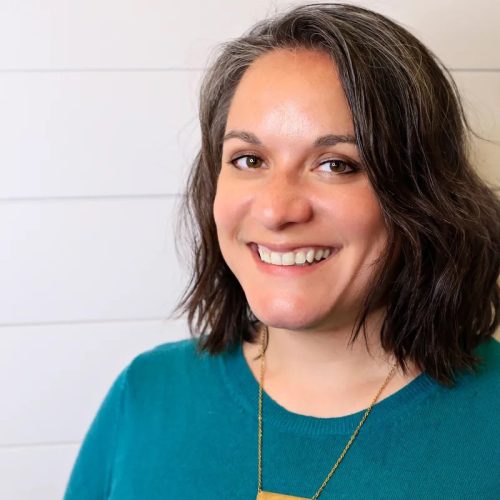
“I am nominating Thea Persinger because she is one of the most creative, kind, caring and all around best people that I’ve worked with in the education field. She cares so deeply for her students. She shows up everyday to give them 100% of herself. She comes up with creative lesson plans to teach her students. She has appreciation days where her students talk about what they appreciate about each other to help build a respectful community. She helps them in any way she can. She is there outside of the classroom as well, going to other activities that her students are involved in. There is a reason they call her ‘Mama P’ and she is most deserving of this recognition.”
Thank you, Thea, for changing the world one student at a time.
Thanks to Brenda for the nomination.
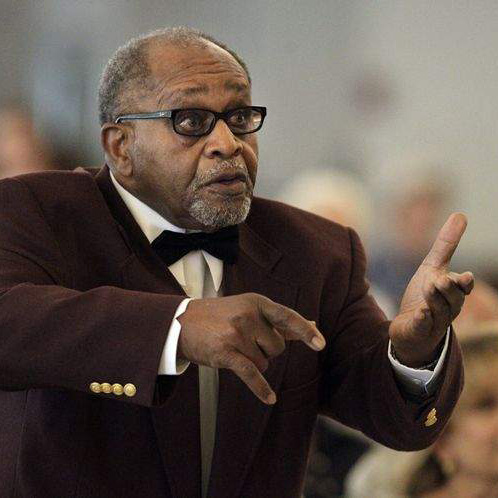
“Samuel L. Hayward, my high school band director, mentor and friend, has left us for the next life. He was a champion among all people and served as a music teacher/band director in the Pinellas County, FL schools for 48 years. He lead the Seminole High Warhawk Band to victory at the 1978 Virginia Beach Music Festival, considered to be the national championship for bands at that time. I was a sophomore trumpet player in that band. In 1979 he went to Countryside High School and stayed there for 24 years until his retirement in 2003. Sam “The Man” Hayward was a quiet, sincere and kind man, and a great teacher. As I look back on my life, it has been the music teachers who made the greatest impact on my character. Sam was one of those, a hero without a cape, a mentor whose quiet guidance helped shape me into the man I eventually became. I will miss him, but he will never truly be gone because I am just one of the thousands of students he touched, and he will live on in all of us.”
Thank you to Jack for the nomination for our Teacher of the Week: Samuel L. Hayward.
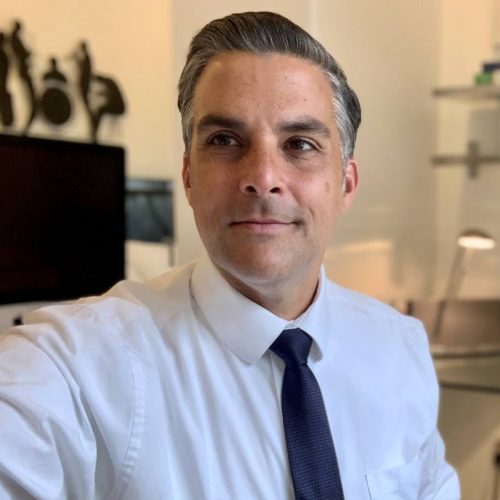
“Mr. Cundari was a part of my life for six years, from middle school to high school. He wasn’t just a typical teacher that I could have had multiple times. He was always trying to raise the bar and shatter the ceiling. He not only pushed us as performers and students, but also as people. He always wanted us to be respectful and be aware that while we may not be on school grounds, we still represent the school off-site, such as at concerts or trips. After I had graduated, he moved on to schools in different states. He definitely left our music program better than how he found it – which is a way I try to view everything in life. While winning is not everything, we typically brought in more trophies to the school than the sports teams. He made our program beyond what most could imagine and looking back, he has also impacted my life more than what I could have seen at the time.”
Thank you, Michael, for changing the world one student at a time.
Thanks to Maria for the nomination.

Congratulations to Mitchell Calderone, our Teacher of the Week. Thank you for changing the world one student at a time.
Thank you to Hailey for the nomination:
“As a first-year teacher, Mitchell inspires and impacts 6th – 12th graders every day. I, his partner, am blessed to get the chance to hear about events that have occurred on his journey thus far. He’s shared the struggles, but more importantly- excitement, optimism and joy that building a choir music program brings him. He holds himself to an extremely high standard, as a teacher, but as a son, role model, friend and human as well. He has grown so much, continuing to be the selfless, empathetic, passionate, and determined person that he is in the world, into the classroom; to the kids.
I’ve witnessed the magical glow of his personality, technique, and dedication to music and keeping the spark of creativity flowing to the people around him, with professionalism, trust, time, and love. I want to bring his impact as a teacher and human to light, as it can be difficult to see yourself amidst all the chaos.”

Jim & Marlene will be retiring this year from Mt. Pleasant High School in Mt. Pleasant, Iowa. Marlene is the choir director and her husband Jim is the band director. They are a staple in the community and have inspired hundreds of students over there 20+ years. They inspire not only music, but creativity and how to grow passions in and out of school. They are the teachers that every student remembers, from Mr. D’s infectious laugh, to Mama D’s look to straighten your act up, their students all have learned a lesson in life from either one if not both. I am honored to be taught by them and think the world should know about them too!

Congratulations to Erin Parrott, our Teacher of the Week, who was glowingly nominated by many of her students. Thank you Erin for changing the world one student at a time.
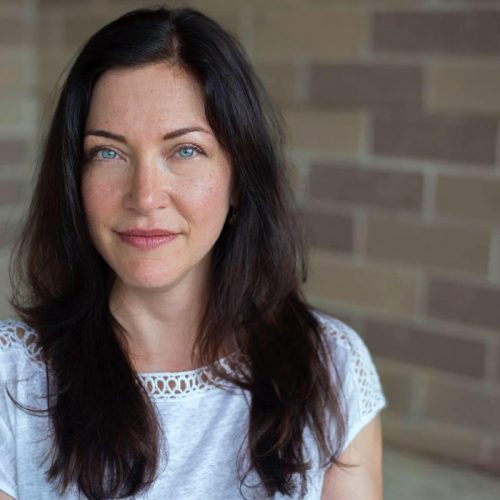
“This teacher changed my life and most students who walk through the doors to her chorus room. She is an inspiration – battled breast cancer and has been in remission!!! She gave us everything she had day in and day out. My day 1 experience in her cross campus choir (both HS in our district) was an awakening that I can only imagine is similar to Eric’s moment in choir singing the requiem. She always had her desk stocked with emergency supplies for her kids as if she were all of our collective mother, ready to spring into action. She’s the first to go to out of anyone if you had a problem with anything, even family trouble or outside of school problems. She is extremely generous in that if she knew a student wasn’t eating or couldn’t afford something to eat one day, she would give them lunch money or her apple or literally anything to remedy the situation. Most importantly she made that choir room the safest environment that anyone and everyone felt welcomed in. She is the reason I sing!”
Thank you Danielle for keeping the flame alive.
Nominated by Joshua.

“Mr. Ziegler is a talented, kind, and loving teacher from Norman North High School in Norman, Oklahoma. He cares very deeply for every one of his students and never hesitates to help a student in need. Mr. Ziegler deserves teacher of the week because during these trying times he has risen above and has done everything in his ability to continue teaching me and the rest of my peers music.”
Thank you, Stephen, for keeping the flame alive.

“Erin Gabriel is the heart and soul of the arts department at The Overlake School. Erin has created an environment in her classroom and the theatre that is safe, inclusive, and welcoming to all. She tells every student; “You are enough.” I can’t express how much those words mean to a high school student. Thank you Erin, for filling the world with music and love every single day!”
Thank you, Erin, for keeping the flame alive.
Thanks to Alyssa for the nomination.

Irene Idicheria is a selfless, compassionate leader in the Boston Children’s Chorus community. Through a time of significant organizational change in BCC’s leadership, through the call to action with Black Lives Matter, and shifting our programming and operations during a global pandemic (each of these things colliding in March 2020), Irene has led our team with empathy, fearlessness, and complete humility. Irene stepped up for our community at a time of great division and heartbreak. She worked tirelessly making phone calls to every student and family–making sure every voice was heard and expertly bringing those voices together in unity. She has stood up with and for her staff through all these trials and always puts others above herself. Through all of these outside trials, Irene has continued to be a beacon of hope and light to her students in the classroom. She makes sure that each child is valued and welcomed.
Thank you, Irene, for keeping the flame alive.
Thanks to Alexis for the nomination.
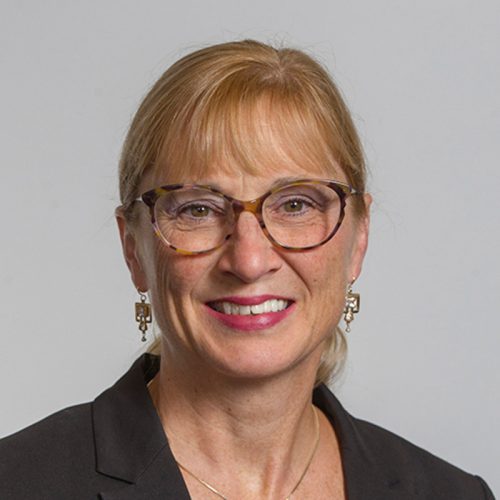
“I nominate Dr. Gayle Walker because she has been an amazing professor before and during the pandemic. She always makes sure he students have somewhere to go to when they need to talk, she is understanding about all situations, and she is beyond passionate for what she teaches. Dr. Walker is an outstanding musician and teacher.”
Thank you, Dr. Walker, for keeping the flame alive.
Thanks to Sofia for the nomination.
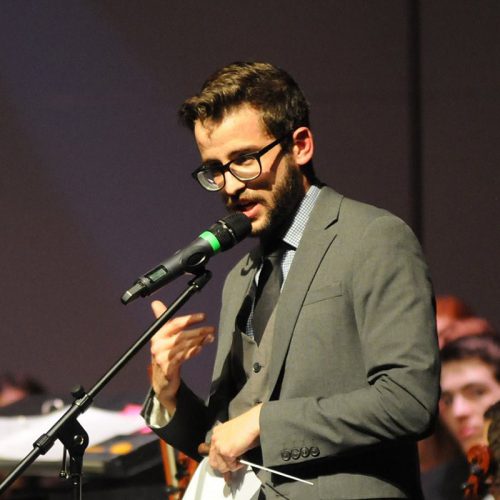
“Mr. Shabestari has been an absolute rock through the coronavirus pandemic. He has never failed to give everything to his students, and where other teachers would have failed or given up, Mr. Shabestari has prevailed and thrived as a teacher. Mr. Shabestari’s classes have truly been one of the only safe places for his students this year. Amid a global pandemic, racial injustice, political frustration, and so many other challenges; Mr. Shabestari never wavered in giving his students a safe music making environment. He has been an inspiration to all of us, and we are forever in his debt for his dedication and kindness.” Nominated by Kade
“Mr. Shabestari, or Shabs, or Shabby, or some other name I can’t think of right now is an incredible director at Alta High School, not only because he’s fun and energetic, but because he genuinely cares and understands his students, heck even some students who go to other schools, but come together for the family that is Alta Marching Band. Shabs makes sure that his Marching Band is one of belonging, everyone cares so deeply for each other and we all strive to lift each other up. Shabs encouraged me to try marching a baritone, and honestly I was a little bit scared, I had only played trombone my entire musical career, so I was nervous that I wouldn’t be any good at it, and that i’d mess up, but he told me that mistakes are everywhere, sure, but learning from your mistakes, that’s the key. Honestly, my life simply wouldn’t be where it is right now without Shabs, and his excellent teaching.” Nominated by John
Thank you, Caleb, for keeping the flame alive.

“Sarah is the choir instructor at North Haven High School in CT. She has changed my life by introducing me to choir music and sharing her passion for it with me. She would stay after hours to help me with difficult sections, introduce me to new pieces to listen to in my free time, and anything else she could do to help me improve as a musician. Above all else, she just wanted us students to appreciate the music we were creating and enjoy doing it. Her passion and enthusiasm for music is contagious and her pride in her students knows no limit. She made her classroom feel like home, like a place where everyone was accepted and music brought us all together as a family. I am truly blessed to have had her as a teacher for 4 years and would not be the person I am today without her.”
Thank you Sarah for keeping the flame alive.
Thanks to Marla for the nomination.
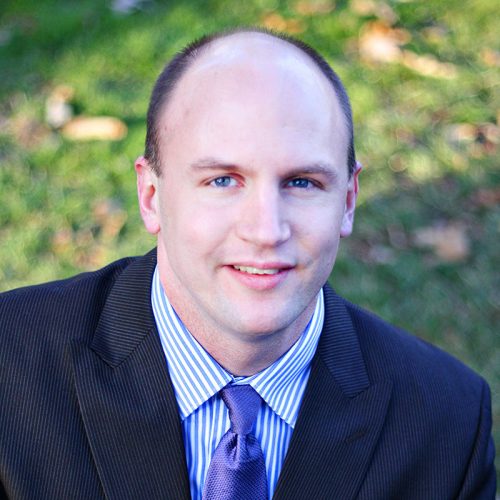
“Mark is a high school orchestra teacher at Centreville High School, Centreville, VA. One of the first inspiring projects in his totally virtual teaching this year was called the Gratitude Project. His orchestra students had to think about people they were especially grateful for during this pandemic. Then they individually thanked teachers, custodians, first responders, nurses, grocery workers, etc. online, and, in virtual ensembles, played special music just for them, to show their appreciation.”
Thank you, Dr. Taylor, for keeping the flame alive.
Thanks to Ginny for the nomination.
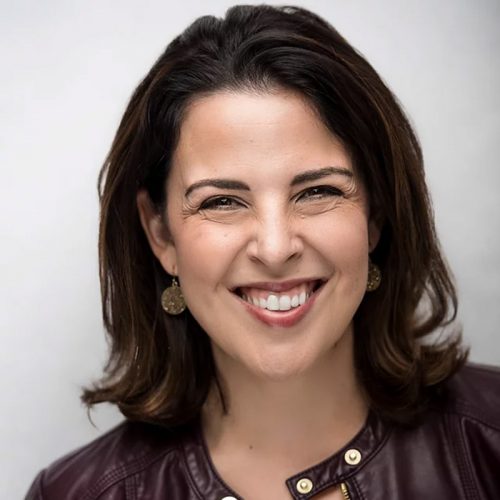
A few weeks ago Alta invited me to speak at Oakland University’s “Inspire the Choir” virtual conference, and from the moment I logged on the energy in the Zoom room was electric and infectious. She is doing such great work, inspiring her students and colleagues with her boundless passion for our shared choral art. THANK YOU, Alta, for keeping the flame alive. – Eric
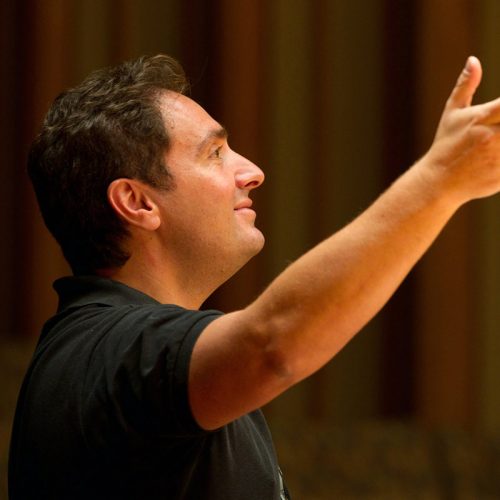
“Dr Misha Shtangrud is the Artistic Director of MUSYCA Children’s Choir and Director of Vocal Ensembles at the Colburn School of Performing Arts, but I am nominating him because of my experience with him in his role as Artistic Director of the Burbank Chorale. Misha is an enthusiast, warm, kind, energetic and inspiring teacher. At the Burbank Chorale, he has a wide range of talent levels to work with, and he is appreciative and encouraging to all. Recently, Misha conducts virtual choir rehearsals through Zoom. He is a one man show! He sings all of the parts, is colorful and dramatic and engaging as he teaches the parts and the pronunciation of different languages. He encourages the singers as if he can actually hear them. He personally transforms our sometimes not so elegant submissions into virtual choir presentations that we our proud to share with friends and family. I am so grateful for the work he and others are doing to keep the Burbank Chorale alive.”
Thank you, Dr Shtangrud, for changing the world one student at a time.
Nominated by Suzanne.
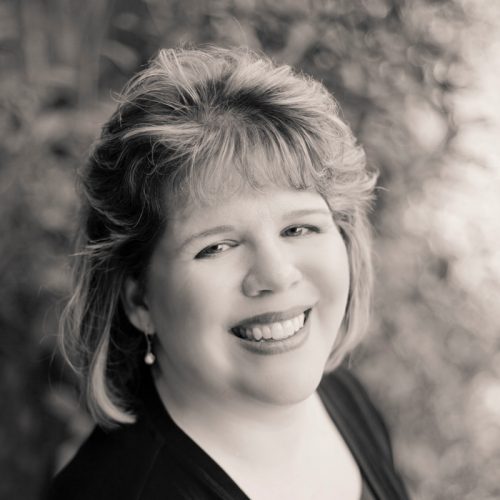
I recently had the chance to give a masterclass led by Maestra Dana Alexander, and what she is doing as a teacher in these difficult times just knocked me out. Every day she is adapting and improvising to find new ways to engage and excite her students and to keep the flame alive. BRAVA, Dana, and thank you for changing the world one student at a time.
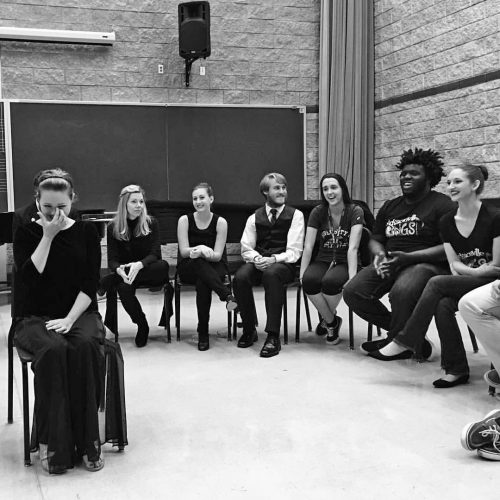
Dr. Cara Tasher, the brilliant Director of Choral Studies at the University of North Florida, has a tradition with her choir called “hot seat.” (That’s Dr. Tasher in the photo, second from left). She and her singers sit in a large circle surrounding a single empty chair. One by one a student comes to the center of the circle, sits down, and closes their eyes. As soon as they sit the people surrounding them gently bombard them with positive adjectives about their character. “Funny.” “Gracious.” “Generous.” “Confident.” “Beautiful.”
The person in the center can’t go anywhere – they must sit and listen to their friends and colleagues sending wave after wave of positive, specific reinforcement describing who they are and what they mean to the tribe. The overall effect was gorgeous, uplifting and deeply human, and as I tearfully told them afterwards in the middle of a big group hug, “This is the most choir thing EVER.”
Changing the world one student at a time – thank you Cara.

“Mrs. Douglas has a profound effect on my life. I will never forget the moment when I fell short of a goal of mine and she simply just held me in my disappointment and told me she was proud of me. She has wisdom, kindness, and such a beautiful soul, and she uses all these things to be a powerful role model for all her students and to love them unconditionally. She not only motivates her students to be better musicians, but she pushes them to be better people. She reminds us to use manners, show respect, and build community. Most of all, she gives us a glimpse of what love and beauty look and feel like through the pieces she chooses for us. I will forever be grateful for Mrs. Douglas’s impact on my life and I know so many others feel the same.”
Thank you, Mrs. Douglas, for changing the world one student at a time.
Thank you Denise for the nomination.

“Mr. Pierson has been a huge influence on my musical experience throughout high school. He’s taught me a lot about the processes in composing a musical piece but also about the importance of never giving up. There were many times where I felt like I had hit a wall in my composing skills but whenever I did Mr. Pierson would always give me some sort of advice to encourage me. Usually, the way I write music is I make the main melody and make other sections with varying themes of it. One time I made something that sounded completely different than what I was going for and instead of telling me to delete it, Mr. Pierson said that I should keep it for another song that I might want to compose. After hearing this advice I went on to write tons of musical pieces based on my scraps from others. Without Mr. Pierson, I wouldn’t be the confident composer I am today.”
Thank you, Mr. Pierson, for changing the world one student at a time.
Thank you Yousef for the nomination.
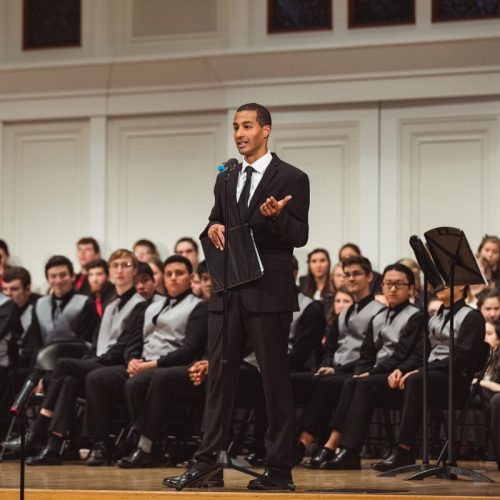
“Dr Hillman inspires all musicians to do their absolute best in everything they do: in music and in life. He is an incredible educator that connects with each of his students. Many of his students can refer to Dr Hillman as a close friend. I cannot think of anyone more deserving of this award. His dedication to his craft is unparalleled, and he impacts the lives of everyone around him.”
Thank you, Dr. Hillman, for changing the world one student at a time.
Thank you Aaron for the nomination.
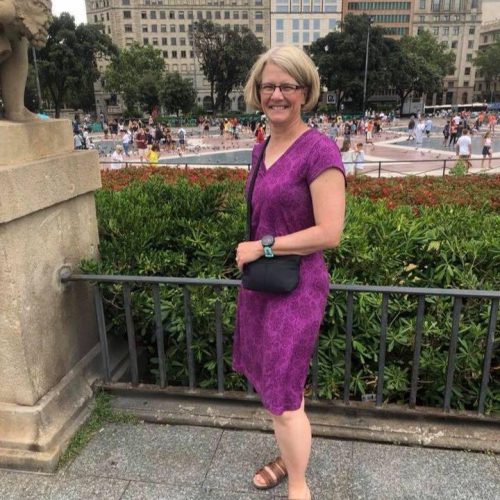
“Mrs. Zemlin is the most amazing teacher I have ever had. During my 4 years in her choir program she made me feel welcomed and like I was a part of something bigger than just a group of people who make music. She is committed to the music and making something amazing together but more importantly she is committed to her students and their well beings. She is an advocate for crushing the mental health stigma in high schoolers and has been a great resource for me and others, I can honestly say I wouldn’t have made it through high school without her. I’m a freshman in college now and she checks up on me from time to time, I look forward to those text messages and emails more than almost anything else. She also taught me what it means to be a leader and the part of a group. I was an officer for our concert choir and as honored as I was she gave me so much responsibility, she made sure I knew it wasn’t about me, it was about the choir as a whole. She’s absolutely deserving of this.”
Thank you, Mrs. Zemlin, for changing the world one student at a time.
Thank you Alli for the nomination.
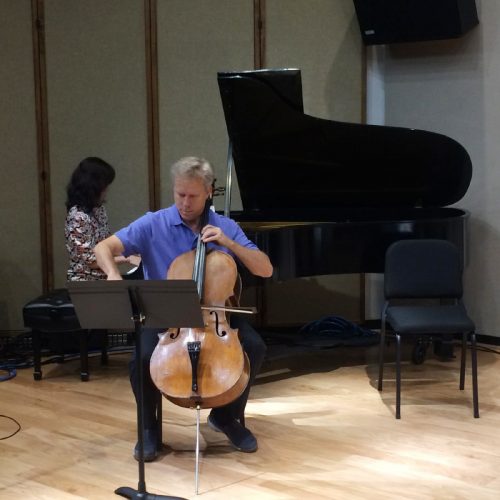
“Professor Kartman is the Cello Professor at University of Wisconsin Milwaukee and is one of the finest in his field. He does whatever it takes in order for his students to grow and achieve what it is they desire. He puts in countless hours and dedicates so much of his spare time to his students and gives them everything he can. He teaches us valuable life skills and life lessons while teaching us artistry and musicianship. He is a selfless teacher and is able to teach students to perfect their craft as well as mold them into true artists. He evokes joy and nothing but a positive atmosphere for his studio.”
Thank you, Professor Kartman, for changing the world one student at a time.
Thank you Ian for the nomination.
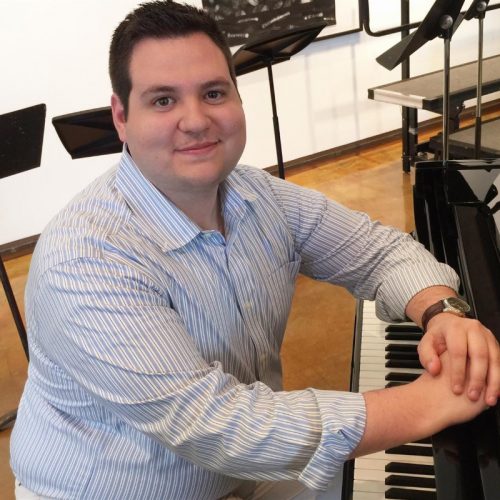
“A good teacher catalyzes learning, but a great teacher inspires passion. Levi stays after school with students every day, pushing them beyond the limits they’ve created for themselves. Levi also started a community choir, the Southeast Texas Vocal Artists to provide a safe place for musicians from all walks of life to come together and perform. Levi’s passion for his students goes far beyond the classroom, and far beyond the music realm. When hurricane Harvey devastated southeast Texas, I was a freshman in college with no way to return home due to the freeways being shut down. My mother sent me pictures of the volunteers demolishing our home, all ravaged by five feet of water. Amongst those volunteers was Levi Duncan. I was no longer his student, but he was in my home- dust mask and dirty clothes- helping us rebuild. 1000 characters is not enough to go into all he has done for same, but I know I speak for the entire community when I say Levi has made a tremendous impact on us all.”
Thank you, Mr. Duncan, for changing the world one student at a time.
Thank you Zoey for the nomination.

“Mandy is an encouraging, kind person through and through. She supports her students after graduation in all their endeavours throughout all of the districts she has instructed. When she was tough with me, it was because I needed someone to hold me accountable and it made me buckle down and focus. When I graduated, she told me to never stop singing, and I’m sure if I hadn’t been encouraged I wouldn’t have. I now am a singer, songwriter, and recording artist and through her vocal training I know how to harness my talents, and through her example, I have patience and love for my fellow family in life.”
Thank you, Mrs. Scott, for changing the world one student at a time.
Thank you Abigail for the nomination.
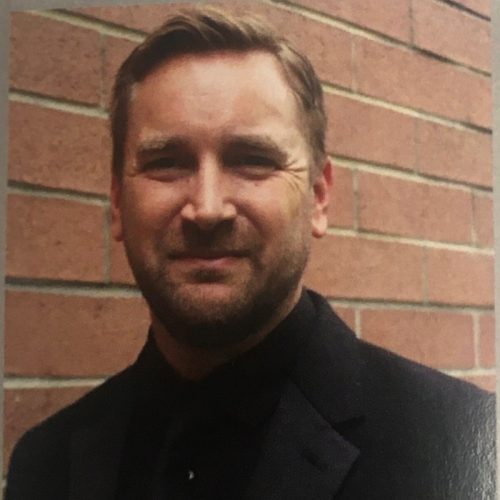
“Mr. G is by far the best director I have ever had the pleasure of knowing and learning from. During my four years with him at Blake, He not only grew my knowledge of music but also made time to develop a personal relationship with each student. Mr G would be the first to make sure each student was having a good day and if they weren’t, he was always available to talk. Mr. G’s quirky personality made choir with him so enjoyable and lightened our often so focused, serious moods. He puts so much time into making sure that each student knows their value and puts so much time into extra activities that benefit his students always. Joseph Galeczka is the type of director students wish they could have because he is simply that amazing.”
Thank you, Mr. Galeczka, for changing the world one student at a time.
Thank you Britney for the nomination.

“Erin Collins is the most extraordinary teacher in the world. Ms. Collins attends every after school rehersal regardless of her own personal schedule and dedicates her own time to plan and attend our every performance. Not only does Erin conduct and teach our choir and her other classes, but genuinely cares about each and everyone of her students and also acts as a part of all of our support systems. Anytime you have good news, bad news, a problem, or just want to talk, she is there. I do not know any teacher as dedicated to her students as Ms. Collins is. Personally, I believe my whole high school experience was 100% better than it would have been because of Ms. Collins. Furthermore, her love for music inspires others and definitely inspired me. Because of her support and the inspirational energy she has, Erin Collins is the absolute best teacher!”
Thank you, Ms. Collins, for changing the world one student at a time.
Thank you Recia for the nomination.
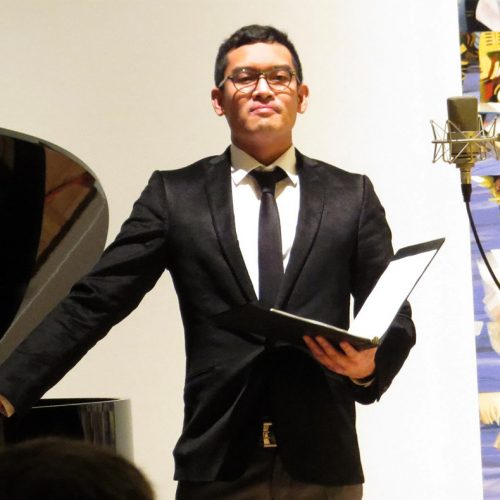
Today we honor the work and memory of an inspirational teacher who sadly and unexpectedly passed away in March 2019. Dr. Gregorio was involved in music making on so many levels from completing the first Doctoral dissertation on the choral music of Tarik O’Regan, to his interest in new choral music, vocal ensemble music and interdisciplinary performance. As Director of Choral Activities at The University of Regina and director of the Gay Men’s Chorus of Los Angeles, Dr. Gregorio truly gave his all to music.
Thank you, Dr. Gregorio, for changing the world one student at a time.
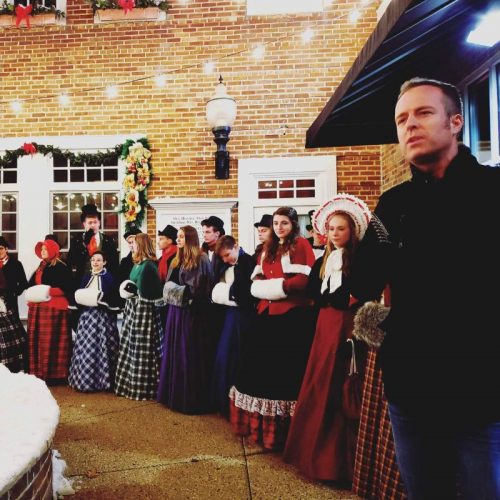
“From the moment you first meet Mr. Wanner, you know there’s something different about him. The care and passion he has for self-expression is evident every day, and it rubs off on every single one of his students. Mr. Wanner does much more than teach music, he teaches his students how to feel and express emotion, how to lift others up, how to be an agent for change in the world. For me and so many other students, current and former, Mr. Wanner is a bright and welcoming light in an otherwise dark and hostile world.”
Thank you, Mr. Wanner, for changing the world one student at a time.
Thank you Lawrence for the nomination.

“Mrs. Adelung makes a really personal connection with her students and you feel a special bond with her. She’s no ordinary teacher, she’s like your school mom. She’s a person that cares about a students way past their education but how they are as a person. She’s instilled a seed of confidence in me that I thought I lost during my years in high school and she really works hard at what she does and deserves a little more recognition than she receives. She’s a wonderful teacher but an even better ‘Mentor’ and she’s truly loved by all that are blessed to have her as a teacher.”
Thank you, Mrs. Adelung, for changing the world one student at a time.
Thank you Kaci for the nomination.
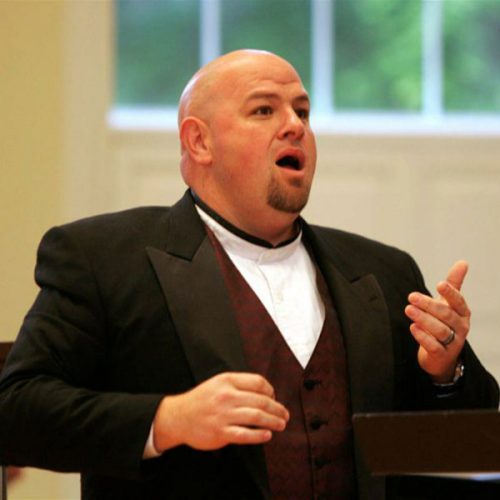
“Mr. Wright is a kindhearted and caring man who loves each of his students with such a heart that it amazes me. He is someone who never gives up on his students and personally impacts me as more than just a teacher. He does his job not because he has to but because he loves to. He deserves this more than anyone I know.”
Thank you, Mr. Wright, for changing the world one student at a time.
Thank you Kenna for the nomination.
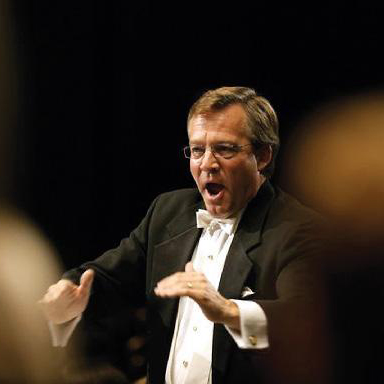
“Dr. Paul Torkelson is the director of choral studies at the University of Nevada, Reno. He directs the Symphonic Choir, the Nevada Chamber Singers and teaches choral conducting. He has conducted many All-State choirs and is frequently a guest clinician at state ACDA conventions. Many students call him Dr. T. Dr. T is an amazing inspiration to me as well as many students that sing for him. He challenges us to think critically when it comes to singing with technique and text stress. He encourages his singers to sing with passion and think about what the music means to them. Dr. T has invited his singers to sing in Carnegie Hall and Europe through the MidAmerica Productions. Dr. T, your kindness, compassion and dedication has greatly impacted many singers. Thank you, Dr. T!”
Thank you, Dr. Torkelson, for changing the world one student at a time.
Thank you Ashley for the nomination.
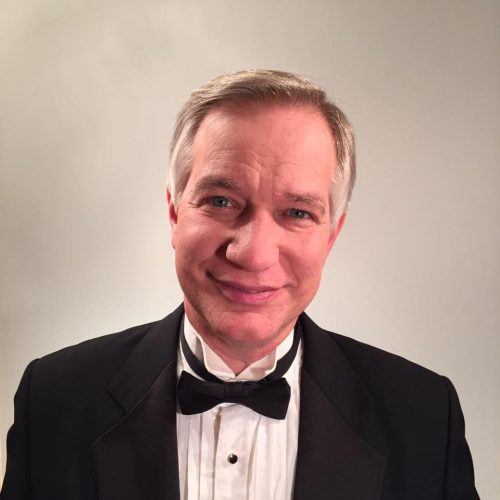
“Mr. Brusubardis somehow manages to teach his students about every aspect of life through choir. He is compassionate, understanding, wise beyond measure, and always saying things which inspire, instruct, and stick with you long after graduation. Many a student (including me) will recall being told by Mr. B before a concert that “you can’t make beautiful music until you have a beautiful heart.” We awaited the moment as we sang when he would give us a look as if to say ‘yes, yes there it is. That is beauty.’ Mr. B is a treasure among teachers, and anyone who has had the privilege of working with him is beyond blessed. He is a role model for those who need one, a class act in his customary blazer, and a trove of endless life advice. His love for his students is visible to all who may walk into his classroom. Many people wouldn’t be who they are today without him, and I truly doubt he could ever receive enough recognition to amount to what he has done for all of us.”
Thank you, Mr. Brusubardis, for changing the world one student at a time.
Thank you Josie for the nomination.
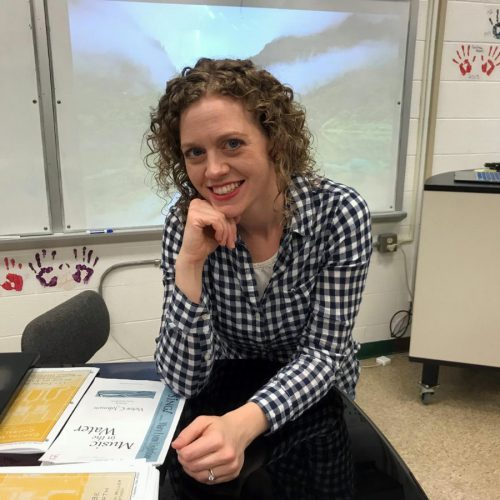
“What makes someone a good teacher? To a student like me, it’s someone who puts the time into the job, cares about their students, pushes themselves to bring out the best in a kid, and is always there when someone needs help. All of those things describe Mrs. Lamb. Whenever we get a new piece of music, Mrs. Lamb sits the class down and takes the time to really describe to us what the piece is about and it’s deeper meanings. Not to mention before every concert or contest she tells us,” It does not matter to me what score we get out there. What matters is that we have the ability to make good music and change somebody’s day for the better. We never know what other people have been through, but we can sing not only to their ears, but to their soul.” It’s words like that that really show to students that there is more to singing then making noise. Mrs. Lamb not only teaches us to be better singers, but more importantly teaches us to be better people.”
Thank you, Mrs. Lamb, for changing the world one student at a time.
Thank you Christopher for the nomination.
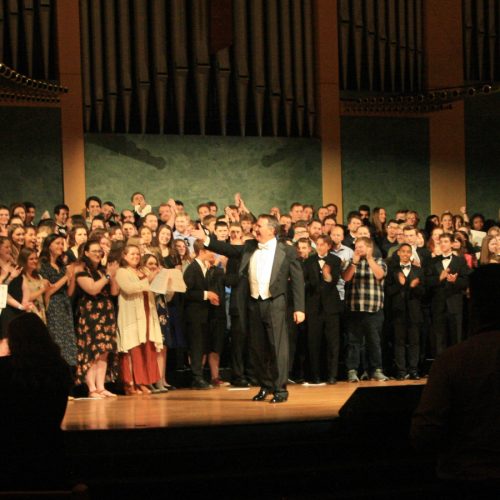
“Mr. Lackman is the most passionate and caring teacher I have ever had the privilege of being in class with. He is the reason many students attend school on a daily basis because his class brightens everyone’s day. After 30 years of teaching at one high school plus many more at other schools, Mr. Lackman told us he was retiring. After the initial sadness, we were able to secretly rehearse two songs for him at his very last choir concert, where he was able to direct every student he’d ever taught for the very last time. Lackman has changed so many people’s lives, and continues to support and encourage us every day. I am so thankful to have been apart of Mr. Lackman’s choir department, he has greatly impacted the way I see the world for the better.”
Thank you, Mr. Lackman, for changing the world one student at a time.
Thank you Maddy for the nomination.
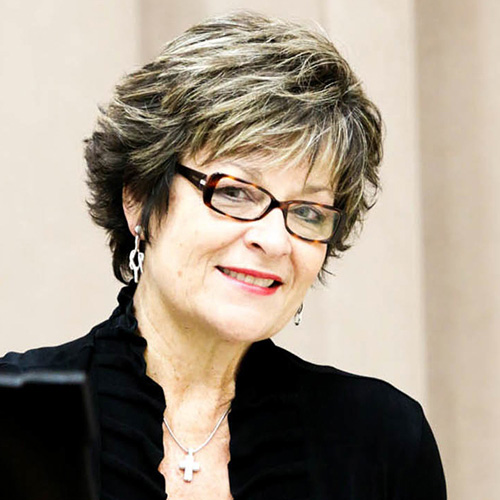
Dr. Gackle is a literal angel— I mean it. When we sit in her office and chat I know for a fact that she is heaven sent. She is an incredible choral musician. She programs music in a way that tugs deeply at your heartstrings. She gives music a story that everyone can relate to, or relates it to an anecdotal time in her life. She doesn’t choose music that is emotionless. Every week, I look forward to our Tuesday/Thursday rehearsals so I can continue to fall more in love with choral music and center myself in what the songs make me feel. She is an incredible educator and I am so lucky and grateful to know her.
Thank you, Dr. Gackle, for changing the world one student at a time.
Thank you Madison for the nomination.

“Mr. Whitaker is one of those people that believes that teaching a subject is not just teaching the subject. He would teach us music, but foremost, he taught us about life and how music enforces the lessons we learn in life. Things like discipline, focus, hard work, dedication, active listening, and many more things shaped our choir to become one of the best in the state! I believe that if it weren’t for what Mr. Whitaker taught us, I might have become someone with a lacking in core values as a person. I wouldn’t be where I am today, and I wouldn’t have the opportunities that I do because I followed his example! He is truly one of a kind!”
Thank you, Mr. Whitaker, for changing the world one student at a time.
Thank you Kaitlyn for the nomination.
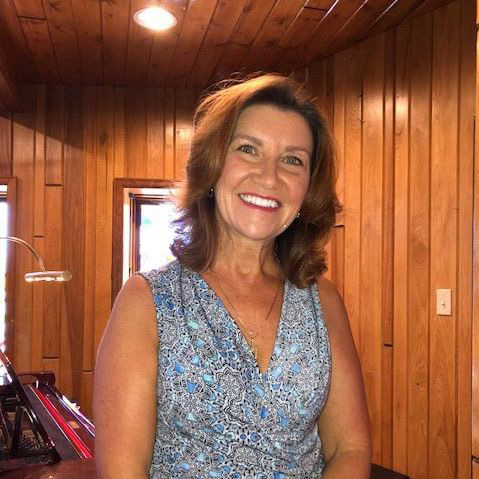
“Dr.B is one of the strongest people I know. After being diagnosed with cancer, she still made her students her priority. Less than a week after having chemo therapy, she ranked all superior in competition. She is amazingly talented and one of the best directors I have ever worked with. She shaped me into the musician I am today but did it with love and support.”
Thank you, Dr. B, for changing the world one student at a time.
Thank you Brittany for the nomination.
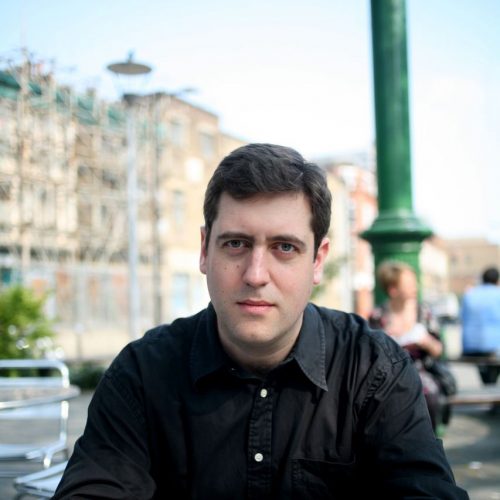
Very few people — in fact possibly only two — can say that they have taught singing to every member of The King’s Singers at a given time. One of those two was Geoffrey Mitchell, a mover-and-shaker in the London singing scene in the 1960s and ‘70s. Mitchell formed his own choir, which pulled together some of the best singers in London. But he also helped the original members of The King’s Singers to develop their distinctive sound (which had its origins in the sound of King’s College Choir) through coaching and advice, once they were out of Cambridge and making it on the world stage.
The other of these two people is Robert Rice, the UK-based baritone and singing teacher, who teaches many singers from lots of the great British choral institutions and beyond. It is easy to imagine that, for a singer, once a certain level of attainment and recognition has been achieved, the role of a teacher diminishes. Yet even many of the very greatest opera singers in the world regularly receive advice and coaching from teachers, and it is these teachers who keep the singers at the top of their game without letting their work stagnate. When someone’s singing (or anything, for that matter) is of a particularly high standard, the role of the teacher becomes almost more important. It takes a particularly skilled teacher, such as Berty in our case, to have the ability, experience and knowledge to identify and help with any issues the one might be having, and to hear the ways in which the craft can still be honed.
Singing, in particular, is an emotionally charged activity. The intimate connection of a person’s voice to who they are makes teaching singing often a delicate process. As well as being extremely knowledgable, Berty is hugely sensitive and is able to encourage progress in people’s singing without ever making them feel flawed, as it is so easy to do. He is particularly good at combining psychological metaphors and images (which create ‘sub-conscious’ vocal results) with detailed physiological and technical information which helps the singer’s understanding of how their voice works. It is for this expertise that many recent King’s Singers have been drawn to Berty Rice; for those of us with a demanding touring schedule, and a high volume of concerts, keeping one’s voice in good working order and never becoming complacent in one’s work is crucial. One element of Berty’s teaching makes him particularly attractive to members of The King’s Singers; he is able to be flexible in what he teaches and how. The art of blending one’s voice to fit into a recognisable group sound (whilst also retaining its solo character) is a very specific one, and not the typical work of a singing teacher, who may prefer to teach in more soloistic or operatic styles. But finding the common ground between different vocal approaches, and happily adapting to the needs of the pupil is one of Berty’s great strengths.
Not content just to be an excellent teacher, Berty is also an adept arranger of music for voices, and has arranged many songs for The King’s Singers, including some of the group’s most popular numbers. Berty is an inspiring character not just for his skills as a teacher, but as an all-round musician who deals in every ‘section’ of the magical process of music-making: composing, teaching, and performing itself.
Nominated by Pat Dunachie, Countertenor – The King’s Singers
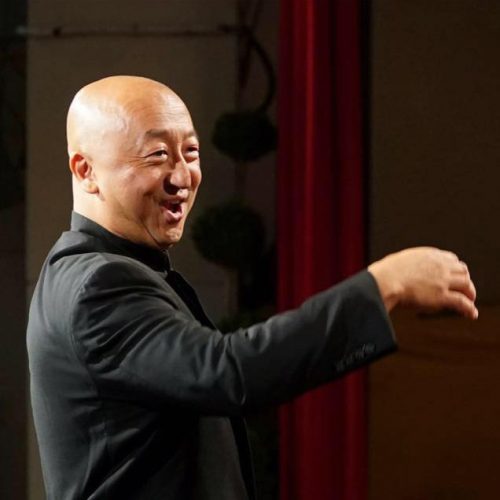
John is one of the best, most dedicated educators I know.
Thank you, John, for changing the world one student at a time.
EW
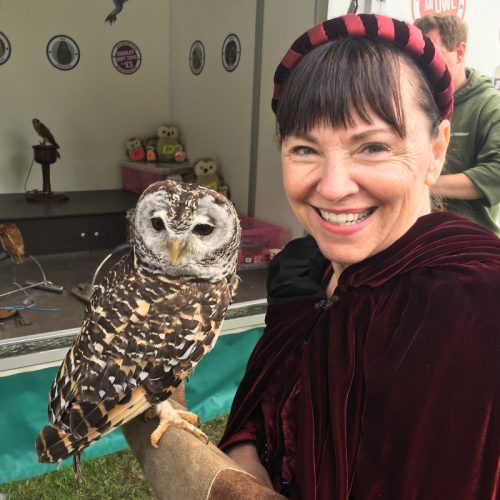
I am nominating Dr. Karen Gardias because she opened my eyes to the beauty of Renaissance music. She is the choral director for three of the choirs at Davis Senior High School as well as the AP music theory class teacher. Dr. Gardias is highly educated not only choral music, but also in music theory. She is so dedicated to making sure her students have a firm music foundation in order to continue to study music or just have a greater appreciation for the art. I have absolutely loved being under her in the Madrigal choir she directs. She is patient, kind, and at the same time, holds high standards for her students which makes all of us strive to do the best we can. She pours out her life for her students and is always available to talk and help us with anything, musical or not.
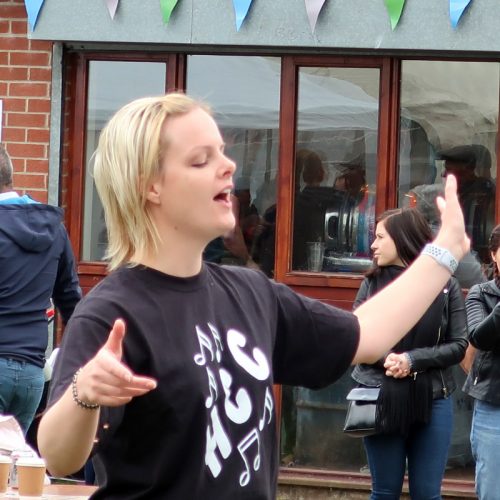
“Sarah Gallop is one of the most inspirational musicians I have ever had the pleasure of working with. She has a gazillion other jobs but finds time and space every Thursday to lead our small, but perfectly formed community choir in Hadleigh, Suffolk UK. Sarah is a music teacher by day, teaches singing in the evenings and STILL finds energy to lead us all to higher grounds when it comes to singing. She is cheeky, chirpy and full of infectious enthusiasm. Under her direction, the choir has gone from strength to strength, gaining confidence in our ability to bring joy to others through music. It is Sarah’s passion that drives us on to challenge ourselves in performances. We have covered everything from Eric Whitacre’s Seal Lullaby to Lady Gaga’s Born This Way, from Orff’s O Fortuna to ELO’s Mr Blue Sky. Onwards and upwards, Sarah G. With heartfelt thanks on behalf of Hadleigh Community Choir.”
Thank you, Sarah, for changing the world one student at a time.

“Mr. Paltrowitz, or Pal as the POBJFKHS music department refers to him as, knows what he is doing. For nineteen years he has been developing a very strong and intelligent choral program within the school based on tradition, leadership, and dedication. I have never seen anything else like it in any other program. In addition to the teacher run choir program, he advises 8 student run A Cappella groups, where all the music is arranged, taught, and performed in two concerts all by students. As the leader of one of these mentioned groups, I credit all my skills in arranging, music making and performing to him. Mr. Paltrowitz even creates articles about his specific systems which can be found on Choral clarity, along with original compositions. He is truly a pioneer in the choral education world and no other teacher can compare to Adam Paltrowitz.”
Thank you, Adam, for changing the world one student at a time.
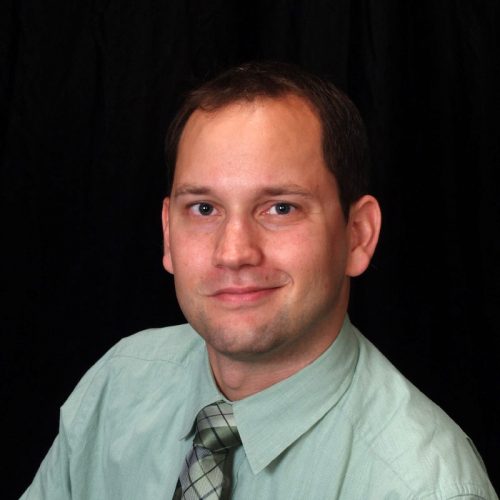
“Dr. Erpelding’s teaching and leadership brought an inclusiveness and camaraderie to the choral program that was missing. He created an environment where no one is afraid to audition. He always inspires with energy and enthusiasm. Dr. Erpelding teaches every choir he works with to express the emotion of the music and that connecting with the music, the audience, and, most importantly, each other is the key to understanding and performing music.”
Thank you, Matthew, for changing the world one student at a time.
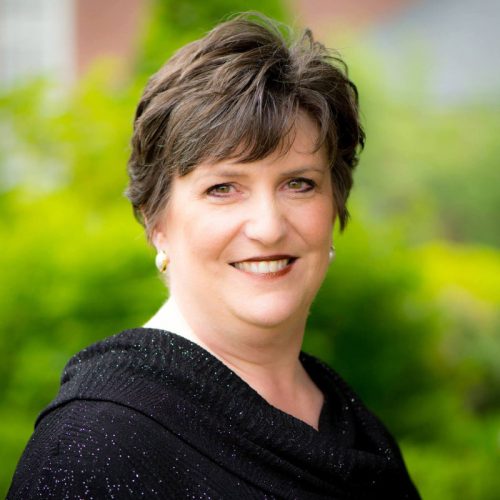
“Professor Tipps is the director of the Middle Tennessee State University Women’s Chorale, and not only has she grown the ensemble from 20 women to over 70 in a few years, she has also taken us to perform at TMEA, ACDA, and at high school’s all around middle Tennessee. She has changed all of our lives for the better and without her my college experience would have been a very different one. She taught me how to love singing again, how to be so in sync with the people around me that it feels effortless. Professor Tipps is one of the crowning jewels at MTSU and she deserves as much recognition as possible for the tireless hours and endless love she pours into her students.”
Thank you, Angela, for changing the world one student at a time.
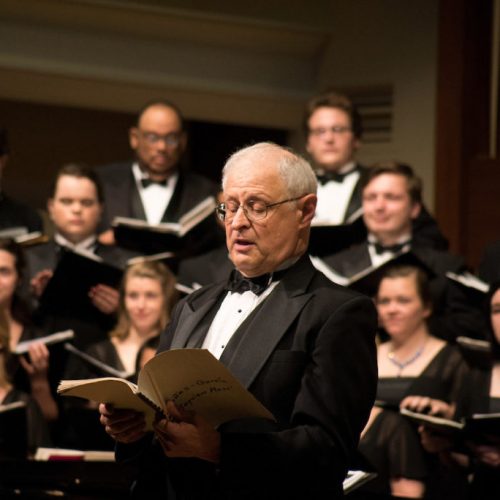
“With his retirement imminent, I am reminded of what an amazing and beautiful person and teacher Dr. Bolster is. Like many college professors, he is well versed and in his craft and profession, both as a choral director and voice teacher, particularly in his knowledge of repertoire and talent for programming, but what makes him outstanding in my mind is the depth and breadth of his sheer passion for choral music and singing.”
“He is a compassionate, passionate person in everyday life and it comes through in the music he makes. He is like family to me and always made me feel like I mattered.”
Thank you, Mr. B, for changing the world one student at a time.
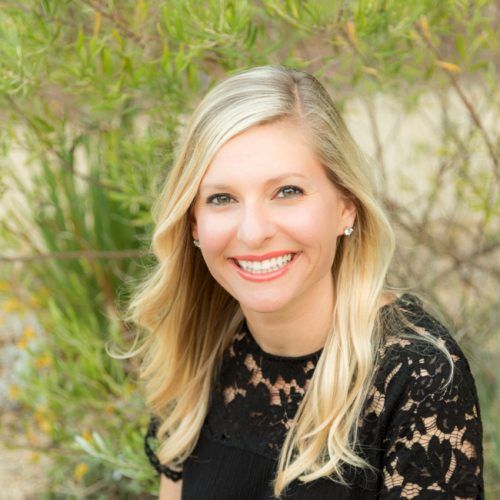
Jennah Delp-Somers – thank you for changing the world one student at a time.
“Teaching is not a pursuit to be taken lightly. The knowledge you impart and the manner in which you impart it can alter the way a student regards the world and their place in it–irrevocably. Teaching demands a degree of self-assuredness earned through the mastery of one’s craft, and, in equal measure, a degree of willingness to abandon pretence and revel in shared learning. Jennah Delp-Somers embodies these principles, and as a result, coaxes excellence from her students. This is my seventh and final year as her student at iSing Girlchoir. Under her tutelage, I have grown from girl to a young adult, and have come to recognize the power in vulnerability. Jennah is a force of nature, and all who know her are better for it.” Nominated by Lauren
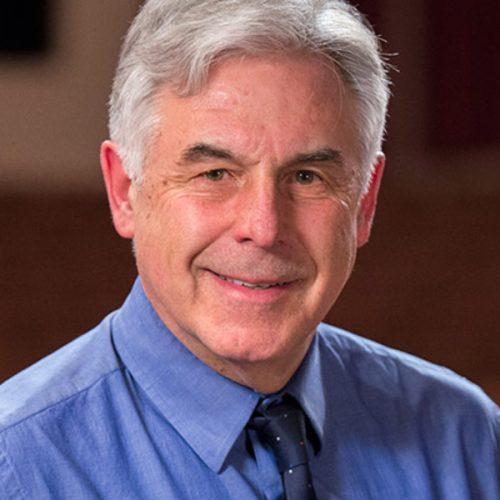
After having changed the lives of so many high school students through his incredible choral and band programs, Dr. Willingham continues his musical inspirations at the university level and helps to bring aspiring young singers and conductors and educators to their own high levels of potential. Dr. Willingham was my high school music teacher who brought out the best in me in so many musical facets and encouraged any and all of my musical endeavours. I had the privilege of then continuing to sing with him at a community level where he brought together all levels of singers to sing, travel, record and enjoy the beauty and comradery of choral singing. Thank you, Lee, for everything you have given to all of the singers, students, conductors and educators whose lives you have touched.
Thank you Lee, for changing the world one student at a time.
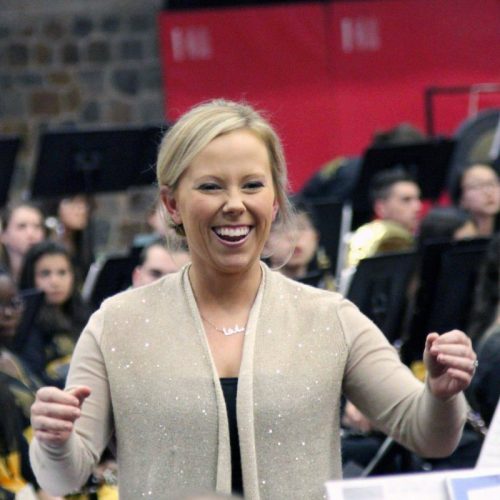
“I have been a choir student for Mrs. Miller since the sixth grade; I am currently a senior. If this doesn’t show how amazing she is, then I would like to put out there that because of her, I pushed myself as a musician to be selected in ACS’s audition-only choir: Chamber Choir. Mrs. Miller is truly one of the most warm-hearted, passionate and positive people I have met in my entire life. She has pushed me to be a better musician and has helped me truly appreciate the richness in music. Mrs. Miller’s connection to music is something undeniable and refreshing, she inspires me to be my best self. In college, Mrs. Miller was apart of the top choral program. Her choir traveled all over the United States to participate in choral festivals. One very memorable experience was in Los Angeles; Mr. Whitacre watched her choir perform Lux Aurumque. I think that Mrs. Miller has truly highlighted the beauty music has, and the stories that can be told all within one to two chords.”
Thank you Martha, for changing the world one student at a time.
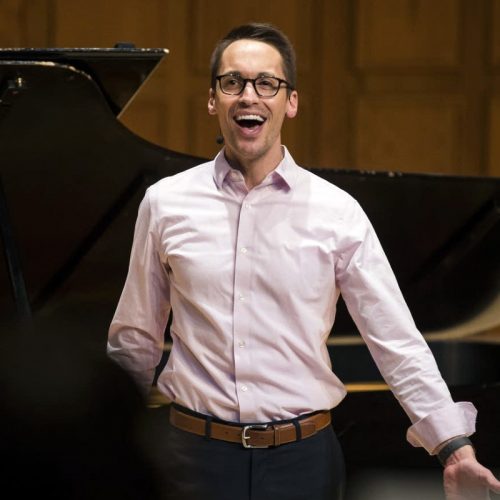
Dr. Amundson received many nominations for Teacher of the Week. Here are a few of our favorites. You can read all the nominations further down this page. Thank you Bret for changing the world one student at a time.
I am nominating Dr. Bret Amundson because of the incredible impact he has made on my life and countless other people. Not only are his music and teaching abilities outstanding, but he also continuously shows every singer how invested he is in the entire process. In addition to developing our musicianship, Dr. Amundson pushes us to think about how we can take lessons from rehearsal and apply them to everyday life. During every rehearsal he highlights the importance of hard work, dedication, mindfulness, and connecting to the story you are trying to tell. He encourages us to set high goals for ourselves and gives us the tools to reach them individually and as a choir. I am incredibly thankful for what he has done for me as a friend, mentor, director, and fellow music lover. Each day he is making a difference in the lives of many and inspires others to do the same. Nominated by: Madilyn.
I am nominating Dr. Bret Amundson because he has changed the meaning of choir. In rehearsals, he emphasises the symbols and messages found within songs in a way that is truly transforming. These messages accentuate the emotions brought out in our performances, giving each song a unique and personalized experience. Dr. Amundson has incredible faith in his choirs, for he pushes us to do our best in hopes of teaching important messages to our audiences, and in hopes that we will use them to transform our own individual lives. Dr. Amundson has shown that choir isn’t only about vocal technique, it’s about changing the world. Nominated by: Elise.
Dr. Amundson inspires me. Whether to be a better singer or a more authentic version of myself, Bret shows me how to go all in and expect greatness from myself and those around me. He teaches our choir to be intentional with our music, and that we have the potential to spread personally meaningful messages and beliefs through song. Bret has a way of using music to inspire and improve the lives of those around him, myself included. Thank you, Bret, for helping me grow. Nominated by: Liana.
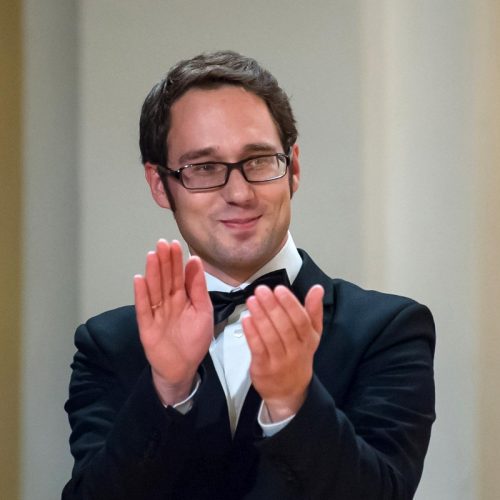
Egidijus Kaveckas is one of the most dedicated musicians we have ever met. Always fully committed to music, he has taught us, that once everyone is sincerely in it, choral singing becomes magic. Since last year when Egidijus started working with us, we have been motivated by his strong sense of responsibility and great work ethics. A natural perfectionist who believes that true beauty can be achieved, he persuades all singers to get the best out of them. Sometimes, when we receive his emails written in the early AM hours, we wonder if he has stayed awake long into the night, or has woken up very early to work on planning our repertoire and other matters. Despite his almost obsessive work habits and orientation to details, Egidijus is emphatic and friendly, his politeness and “no drama” approach keeps rehearsals cozy and goal oriented. We would like to thank him for being a great musician, teacher, and a wonderful person.
Thanks to Dovile & Evaldas for the nomination
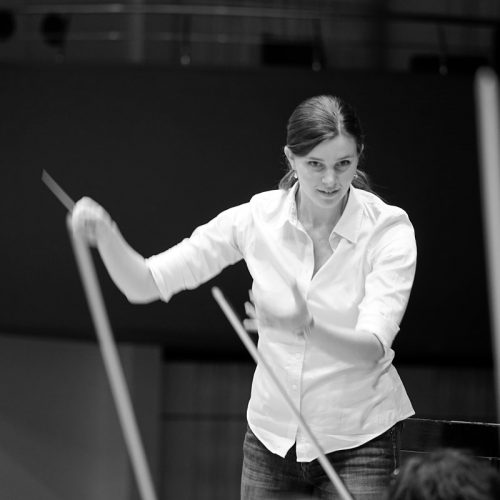
Thank you, Kathleen, for your dedication to teaching and for changing the world one student at a time.
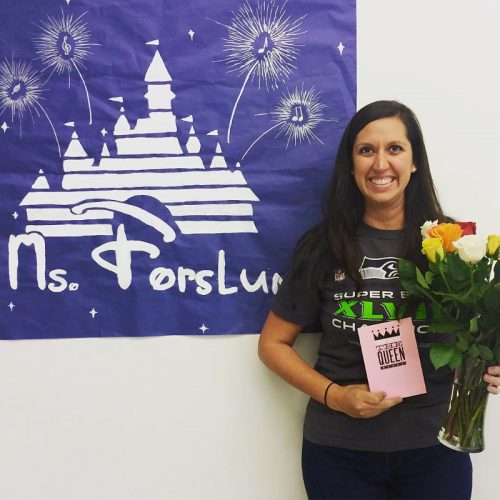
Heidi Forslund is a force to be reckoned with. For 7 years, she commuted between two schools, Cavelero Mid High and Lake Stevens High School, so that we could have a strong program in our district. When Heidi arrived at Lake Stevens School District, she had very small numbers at both schools (a mere 25 at the high school) and choir was not a name in our community. For the next 7 years, she worked hard to build structure and family within the district’s choir program. She upped the program’s overall participation to around 190 students with 2 classes at Cavelero, 2 at the High school, and one smaller jazz choir in the morning. Over the years, we have gone on to win many awards and many 1+ scores at both schools. Choir became a known force in the community, one that even band couldn’t overshadow. Heidi is someone else. She taught us values that no other music teacher had taugh me and gives everything she has to make sure choir is a thing everyone wants to be a part of and feels welcome.
Changing the world one student at a time – thank you Heidi.
Thanks to Gaby for the nomination.
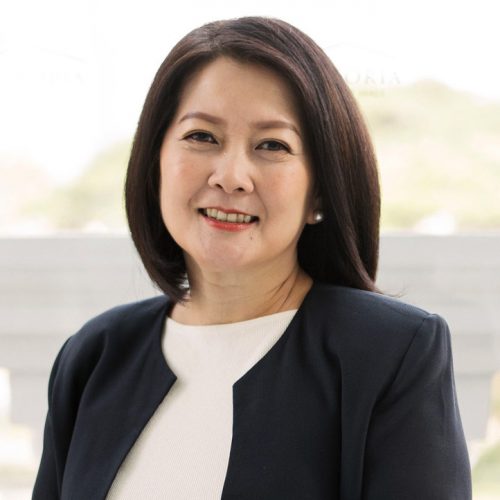
The success of the Singapore Symphony Children’s Choir is testament to choral director Mrs. Wong Lai Foon, who has since 2007 built an empire of youth choirs under the SSO banner, inspiring a new generation of choral singers to strive for musical and artistic excellence. The Children’s Choir performs regularly with the Singapore Symphony Orchestra and has collaborated with other world-class artists for sell-out performances. Wong is naturally in huge demand within her community for her conducting skills, and she is a joy to work with.
Changing the world one student at a time – thank you Wong.
Thank you Emily for the nomination.
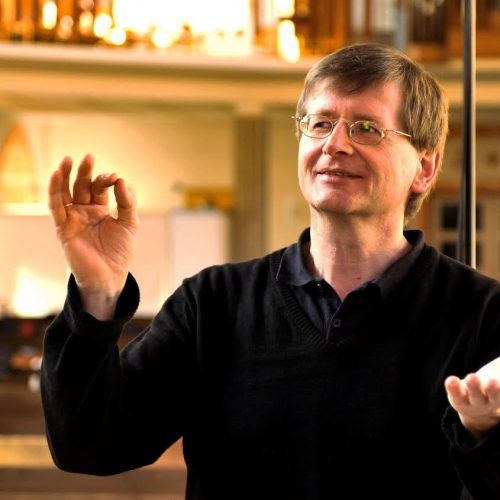
This man is a force of nature. Based in Hannover, he has been involved in music at almost every level in Germany, in the classroom, on the stage, on committees, educating and creating new ensembles, taking them far and wide sharing culture and passion for music. His effusive charm sits alongside a determination to see each individual fulfil their dreams and potential.
Klaus-Jürgen, I thank you
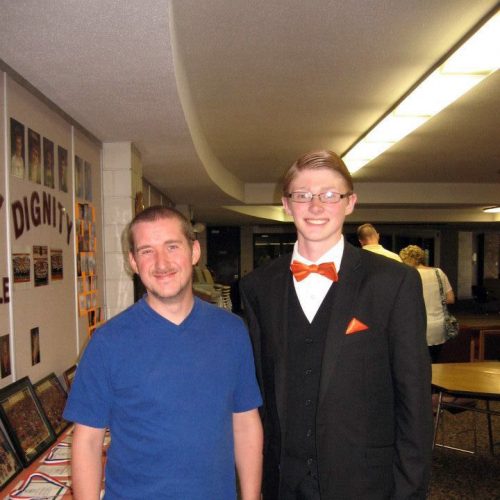
Adam Orban or “Master Orbiwan” as we called him (if you’re a Star Wars fan you’ll get it,) was my high school choir teacher and has been one of the most influential people in my life and countless others. He taught me in chorus and music theory from 7th Grade through high school. I owe him an incredible gratitude for being one of the people to understand me for who I was and who broke my shell wide open and forced me to do things out of my comfort zone. He saw an awkward, shy 7th grader who wouldn’t speak up in class even if called on, and saw potential in him. His passion for choral music was also contagious. In his time in Sheldon, IA, he took our small choral program to unimaginable heights. At the height of the program, the jazz and show choirs got consistent 1st places and the concert choir was getting straight perfect scores at state contest. I am proud to say I am now a choral director myself and get to call him a colleague and a friend. He truly changed my life.
Changing the world one student at a time – thank you Adam.
Thank you Jacob for the nomination.
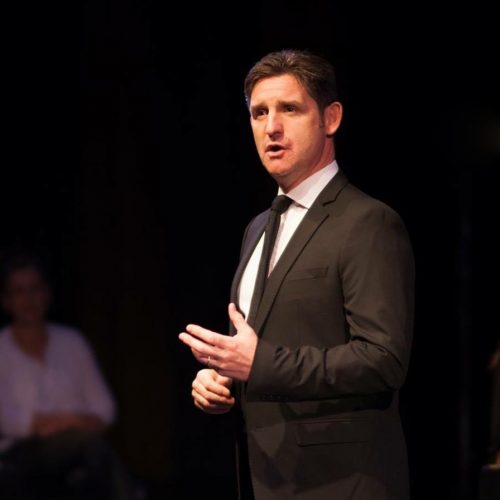
This man gave me a most precious gift. He helped me to rebuild my confidence and positivity which means more than I can say. He helped to change the colour and horizon of my world, both for my life and career. He let me know I am stronger than I can imagine. He generously shared his wisdoms and talents with great sense of humour and genuinely engaged the world through his golden voice and his golden heart. He inspired many people to become ‘a better version of themselves’. I will try to pass things I learned from him on to my students as well. Heartfelt thanks to Paul Phoenix – former King’s Singer and now Purple Vocals. You are an incredible man.
With thanks to Mingxia Xiao in Tianjin for the nomination.
Thank you, Paul, for changing the world one student at a time.
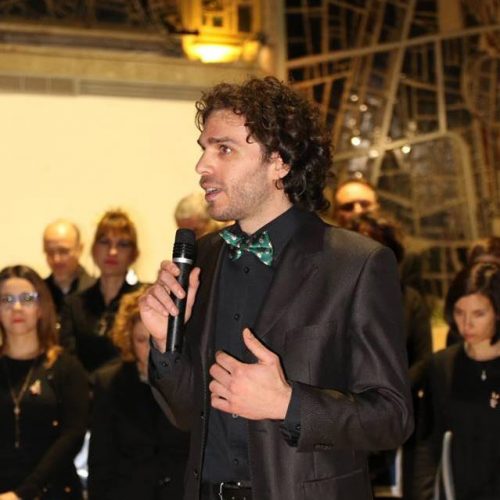
“Everyone is able to sing, there aren’t out of tune people”. – Claudio Silvestri
It’s been a privilege to read the stories of all those who contributed to nominated Maestro Silvestri.
Thank you, Claudio, for changing the world one student at a time.
Thank you to Peter Hollens for nominating his high school choir teacher, Russ Otte.
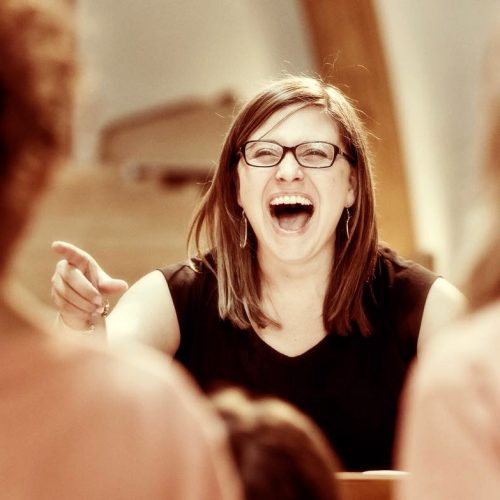
With an incredible 9 nominations received this week, Amanda Hanzlik – you are our Teacher of the Week.
Thank you for changing the world, one student at a time.
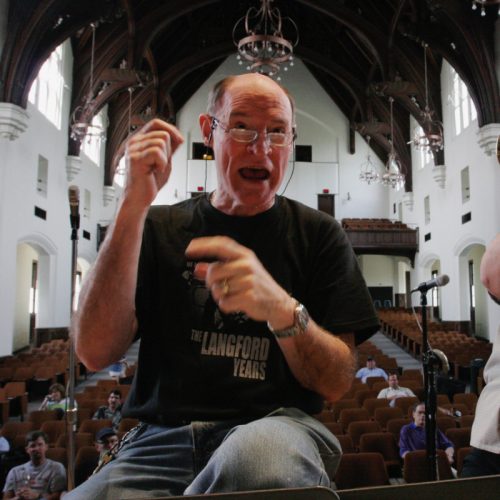
For more than 40 years Gary Langford has dedicated his life to music and music education. He was my trumpet and jazz professor when I was a freshman at the University of Florida and through the years he has given so much to so many, in music and just by being a wonderful mentor and human. It was Gary’s honesty that convinced me to change my major from trumpet performance to journalism, and he always was straightforward and kind in his feedback and advice. I went on to have a successful 30-year career as a journalist but never stopped playing or loving the trumpet, jazz and music because of Gary’s undying enthusiasm and spirit. Ask anyone who has met him and they will say the same. Gary is an inspiration to all.
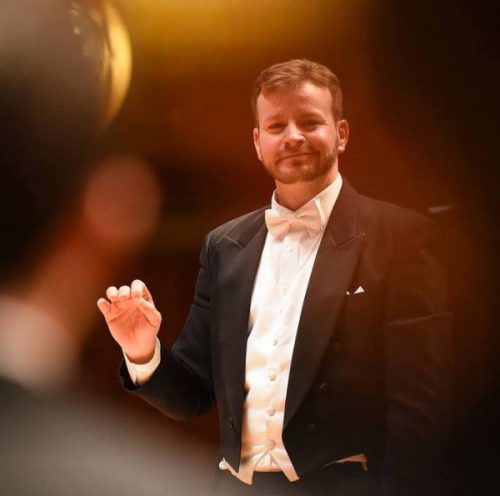
Steve Durtschi is one of the hardest working teachers I have ever had the pleasure of working with. His dedication to his students and the art of Choral conducting is unparalleled. During my time working with Steve Durtschi I learned so much about musicality and appreciation for the benefit of hard work. Steve Durtschi has been teaching all Choral and AP Music Theory classes at Timpanogos High School since 2010. During his time there his choirs have achieved the highest ranks possible at festivals they’ve participated in.
Changing the world one student at a time – thank you Steve.
Thank you Kris for the nomination.

While Michelle is clearly an outstanding professional, mentor, musician and teacher, I believe she should be viewed foremost as an outstanding leader. After years of setting the standard as a “young” teacher, Michelle has now transitioned to a “seasoned veteran” who leads by example on a daily basis for not only her students but co-workers as well. Michelle’s unwavering approach to her daily tasks as an educator is a beacon of professionalism for all to see. She truly displays the philosophy that she is teaching young adults how to be better human beings through singing, as opposed to simply becoming a good musician. She runs three choirs, as well as numerous smaller chamber groups with over 200 students enrolled. It does not matter what level of performer you are, if you are willing to put the work in, she is willing to give her time to teach you. Truly inspirational!
Changing the world one student at a time – thank you Michelle.
Thank you Chad for the nomination.

Emmanuella Mazile teaches choir at Lowell Scott Middle School. She’s only in her second year of teaching and has already made such a difference in their music program and in the lives of her students. Her kids come to class excited to learn because she engages them with respect, humor, and love. They’re not just learning songs in Miss Mazile’s class; they’re learning how to be musicians. Parents, teachers, and students alike recognize how beautifully–and quickly–she’s transformed an “easy A” choir class into a high-quality music education. Emmanuella is an incredible, natural teacher and advocate for kids who are often navigating a tumultuous period of their lives. I met Emmanuella in college while we were both studying music. I’m so immensely proud of her and thankful to call her my best friend; she’s a daily source of inspiration for me and I’m absolutely thrilled for all of the students in the years to come who will get to learn music from Miss Mazile.
Changing the world one student at a time – thank you Emmanuella.
Thank you Aubrey for the nomination.
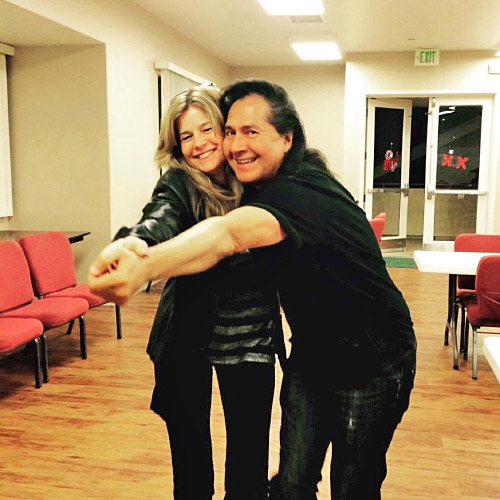
With his open heart and musicality, Rich has given back to the community. He conducts with the City of Angels Community Choirs in Granada Hills, CA. This community choir includes the Master Chorale, as well as Children’s Choir. His empathy and open arms invite you to join not only a group of singers, but a family – a humble family that creates wonderful music for the community. Rich has given the choir the opportunity to go Christmas caroling at a local hospital each year in December. He has also dedicated a concert for the children and has raised money for children’s scholarships. Rich has dedicated engraved hand bells of those who lost their lives in Sandy Hook.
Changing the world one student at a time – thank you Richard.
Thank you April for the nomination.
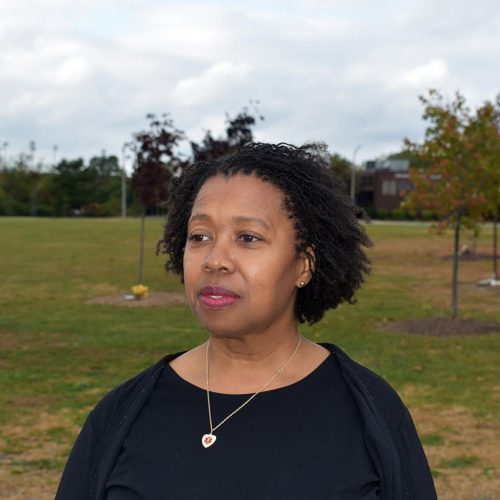
Sheena is an outstanding choral educator, who’s breathed new life and meaning to students in Bridgeport CT’s inner city high school. After years of budget cuts, music is back: “On Friday mornings, students are serenaded by musical performances as they cue up to go through metal detectors. As people are coming in, security guards are bopping to the music as they check bags.” Sheena has just been awarded Connecticut Teacher of the Year for 2019.
Thank you, Sheena, for changing the world one student at a time.
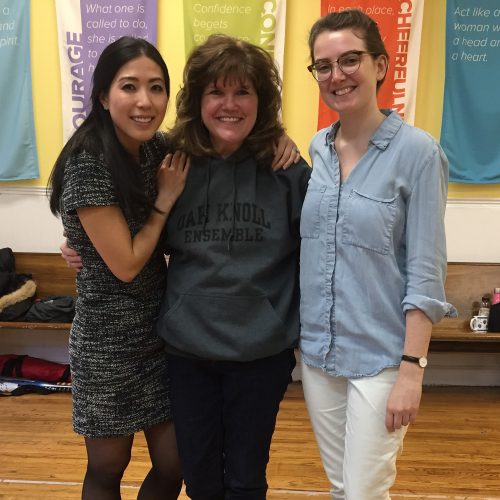
Mrs. Ruby Robertson-Knox, Music Director at Oak Knoll School, has been a part of the music world from her childhood, later studying at Baylor U, and teaching for 40+ years. She fosters a special choral community of singers from grades 7-12, a drama troop, full musical, masses, and two chamber choirs. Service is also one of the biggest aspects of OKS and Ms. Knox’s philosophy. Ms. Knox teaches us to be grateful for our school, one another, and music. She is passionate for the arts and knows the powers of choral music to heal and make community. Music brings her happiness and joy, thus bringing it to students. She aims to better us and implores students, who she calls her children, to be passionate about their dreams. Ms. Knox’s talents are countless: a stunning singer, pianist, and conductor who conducts from the piano bench, never missing a cue while playing beautifully. She is there for all of us. Her light is felt by all. “Ruby” is truly a valuable gem and shining star.
Thank you Ruby, for changing the world one student at a time.
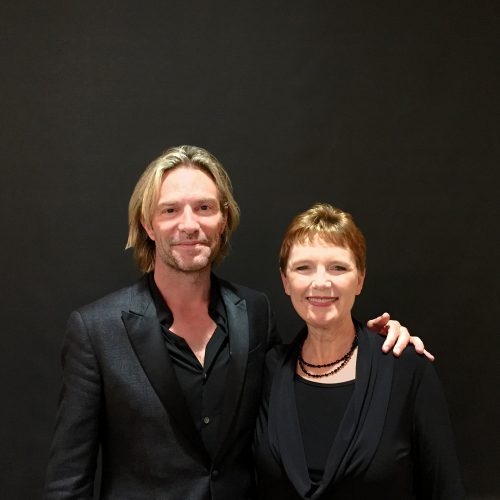
I met Janwin at TMEA earlier this year and was blown away by the connection that she had with so many former-students across the time we spent together. It’s not a surprise that she’s been honored with the FISD “Making a Difference” Award and the Outstanding Music Educator Award from the Houston Symphony Orchestra.
Janwin – thank you for changing the world, one student at a time.

Dr. Spence is an associate professor of music at Elizabethtown College, as well as the director of instrumental studies. He conducts the Symphonic Band and the College-Community Orchestra. In 2017, he was awarded the Kreider Teaching Prize, which is given annually to an outstanding educator at the college. I had Dr. Spence in class during every semester of my college career. He is the prime example of a deeply caring and passionate educator. During his classes, his manner of speaking creates the feeling that he is speaking to each student individually, rather than addressing the group as a whole. He can often be found in his office, essentially giving private lessons to students from his instrumental methods classes. And to top it off, his dry humor is unmatched. Perhaps my favorite memory is his recent comment on my Facebook post, informing friends and family that I accepted a full-time teaching job: “Thank you for your contributions to my future Social Security checks…”
Changing the world one student at a time – thank you Robert.
Thank you Abby for the nomination.

I would love to recommend Ms. Sandra Chandler, choral teacher and director at Alexander High School, Douglasville, Georgia for this honor. She is a splendid teacher, award winning in her district, and greatly loved by her students. She is a prime example of what ACDA stands for.
Changing the world one student at a time – thank you Sandra.
Thank you Tim Sharp, Executive Director of ACDA, for the nomination.
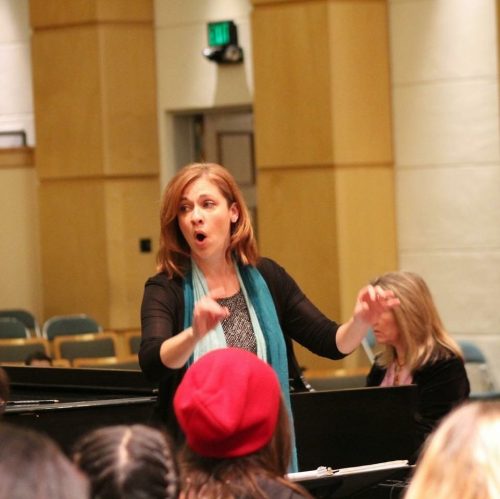
Dr. Chiaravalloti is the Director of Choral Activities at Fort Lewis College in Durango, CO. Dr. C, as we call her, is one of those teachers that changes your life. She’s the standard by which you hold all other teachers, even though you know you’re never going to have a director quite like her again. She loves and cherishes music, but she loves and values her students even more. Dr. C supports each and every one of her students, and helps us to grow not only as musicians, but as confident, competent human beings. No teacher has ever changed my life quite the way Dr. C has.
Changing the world one student at a time – thank you Charissa.
Thank you Allie for the nomination.
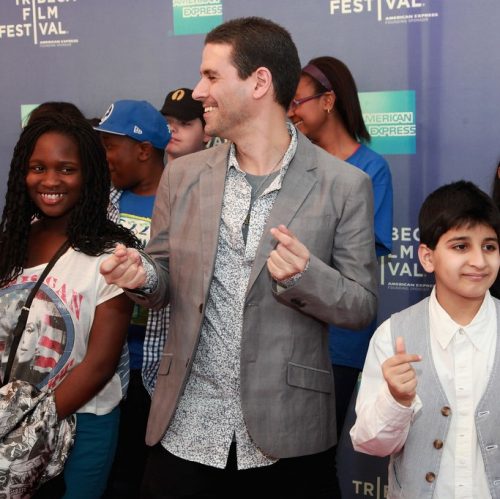
It was my honor to meet and work with Gregg Breinberg “Mr. B” and the incredible choir, PS22, (from Public School 22, Graniteville, Staten Island, New York) in 2000. Their continued success must surely come from Gregg’s vision, integrity, passion and dedication to young people and music. Each year he auditions children from 10 years old to join PS22 from the school’s wide cross-section of ethnic groups and socio-economic levels, encouraging them to sing as one and express themselves through music. The emotion is palpable, both listening to them and watching them. Mr. B and PS22 have had truly massive success on YouTube, appeared at the Oscars, the White House, on the Oprah Winfrey Show and with Katy Perry and more. Crucially, this team of engaging super-talented young people rehearse twice a week in term-time and sing at school and local events. Mr. B, you are an incredible force for good in an area that continues to face huge challenges.
Changing the world one student at a time – thank you Gregg.

George Hattingh Jr has been a big part in making the dreams of thousands of aspiring sound engineers, including myself, come to life. He is a lecturer and a director at the Academy of Sound Engineering in Auckland Park, South Africa. He is a mentor to me and one of my biggest role models.
Changing the world one student at a time – thank you George.
Thank you Ethan for the nomination.
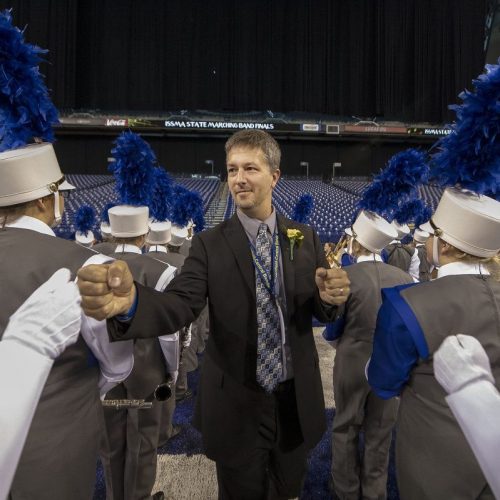
As the band director and head of the music department at Greenfield-Central High School, Mr. Wing built a phenomenal marching band and a spectacular concert band program from the ground up. Starting with a horn line that totaled fewer members than the current woodwind section, he pushed through adversity, giving every member the knowledge they needed to thrive, and continues to strive, not for trophies or medals, but for improvement and exceptional performance individually and as a group. He will be the first to admit that if there are points available, he wants them all. However, his desire for the Greenfield-Central Cougar Pride Marching Band to be the best it possibly can overrides his competitive nature, and he implores us to focus on how we improved over how we placed.
Changing the world one student at a time – thank you Chris.
Thank you Elysabeth for the nomination.
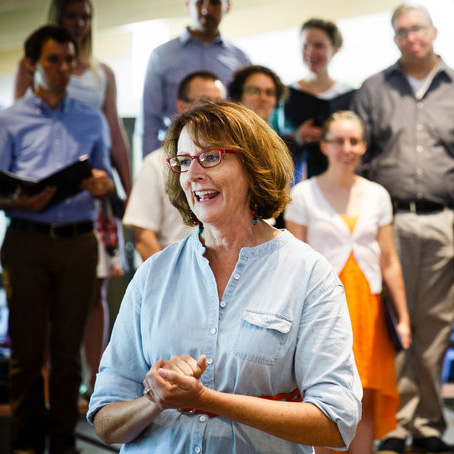
Dr. Broeker is the most loving and generous human being and an incredible Choral music educator. She teaches with such kindness, empathy and grace and is an inspiration to all of the students she comes into contact with. After two weeks of graduate conducting this summer, she gently reminded our class “You are enough. As you already are, you are enough.” Her belief in each of her students is so encouraging…and she is a brilliant musician to boot!
Changing the world one student at a time – thank you Angela.
Thank you Coleen for the nomination.